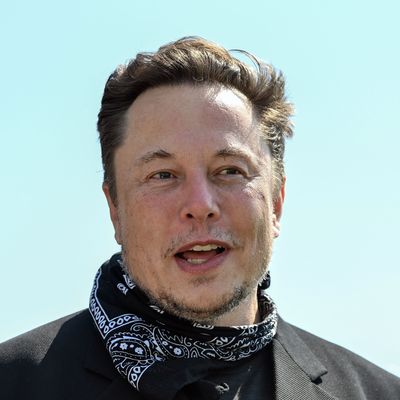
This morning, Elon Musk, the CEO of Tesla, did what people have been speculating he’d do, if only half-seriously: He offered to buy Twitter for some $43 billion and take it private.
That eye-popping figure was trending on, of course, Twitter, where Musk has been critiquing the company in a series of troll-y tweets over the past few weeks, even as he built a more than 9 percent stake in the company itself. Musk initially indicated his investment would be passive when he announced it early this month, then said he would join Twitter’s board — only to back out the morning of what would have been his first day.
The only number worth paying attention to, though, is the amount Musk says he’s willing to pay per share of Twitter: $54.20. See, it has “420” in it, the unofficial code for weed. In the realm of corporate M&A, that would usually mean nothing, but when it involves Musk, already the “meme lord” of Twitter even before his embrace of dogecoin, it’s actually quite material. Musk loves jokes involving 69 or 420 or both, as when he tweeted in 2018 that he had secured funding to take Tesla private for $420 a share, which turned out to be the sort of joke that got him sued for fraud by the Securities and Exchange Commission.
Lest you think this was mere coincidence, consider that Musk, in his official letter to Twitter, notes that his offer is 38 percent above Twitter’s stock price before he announced his investment. He seems to have rounded down from that by about a nickel per share, presumably to include the 420 joke.
Then there’s the seemingly casual way Musk came to make his hostile-takeover offer — and yes, it’s considered hostile, because Musk skipped the part where, normally, he might have sat down with Twitter and negotiated a deal. “I am not playing the back-and-forth game. I have moved straight to the end,” he told Twitter’s chairman in a voice-mail last night, according to a regulatory filing. “After the past several days of thinking this over, I have decided I want to acquire the company and take it private,” he added in a text message to the chairman. “Are you available to chat?”
It’s not clear how many hostile bidders inform targets of their intentions via text, but as a general rule, deals of this size take more than a few days to come together. Let’s be honest: Taking a weekend to think about spending more than $40 billion on a famously dysfunctional social-media company whose value is just over half of its rival Snap’s, and that has cycled through corporate strategies more often than CEOs, sounds more like Musk lit up a joint and decided to rile up Twitter in a way only a billionaire troll could pull off.
After all, Musk decided not to join Twitter’s board on Saturday morning, apparently around the time he tweeted “Is Twitter dying?” after observing that Justin Bieber and Taylor Swift don’t tweet much.
Musk, who fanned the flames of last January’s GameStop and AMC trading frenzy, appears to have achieved peak meme stock, blurring the lines between the market and satire with multibillion-dollar punch lines. It’s something only the world’s richest person, with a net worth of more than $270 billion, could do. (Some have questioned whether Musk actually wants to own Twitter; his offer lists the source of funds for the purchase, instead of his personal fortune, as “other.” While he should have actually secured the funding this time — if he has learned anything from past mistakes — most of his wealth is bound up in Tesla stock, not sitting around in cash. And as the mother of Musk’s newest children recently told Vanity Fair, “Bro lives at times below the poverty line.”)
In his letter offering to buy Twitter, Musk said the company needed to “be transformed” by going private, noting Twitter had “extraordinary potential”: “I will unlock it,” Musk promised. So far, though, Musk’s proposed changes to Twitter (which he proposed on Twitter, naturally) included transforming its headquarters into a homeless shelter, along with adding an edit button to tweets, neither of which seem likely to add much to the company’s bottom line.
There’s also the issue of Musk’s personal bandwidth. Twitter and Tesla had long had something in common, in that their CEOs also ran other companies, until Twitter’s former CEO Jack Dorsey resigned that post last fall, concentrating on his other (more valuable) venture Block, formerly known as Square. Investors like Elliott Management had questioned Dorsey’s ability to simultaneously run two companies; with Musk already overseeing twice as many — including SpaceX and the Boring Company — it’s hard to see his plans for Twitter as much more than a hobby, at best.
If you work at Twitter right now, though, or if your work even involves being on Twitter, you may be less worried that Musk’s offer is a joke than that it might actually be serious. If Musk were to take control of Twitter, his platform for meta-memeing would expand further. Remember that this is a guy who started selling short shorts in Tesla’s merch store simply to troll hedge funds shorting his company.
Besides memeing, Musk, despite pledging his belief that “free speech is a societal imperative” in his offer to Twitter, has a reputation for capriciously blocking those who offend him. (I, for one, have remained blocked by Musk since around 2016, when I questioned the conflicts of interest involved in Musk’s buying a company — Solar City — run by his cousin and merging it with Tesla.)
Twitter’s stock initially popped after Musk revealed his bid. By the afternoon, it had flattened, even trading down at times, and hovered well below the proposed takeover price, suggesting Wall Street isn’t taking Musk too seriously either.






























